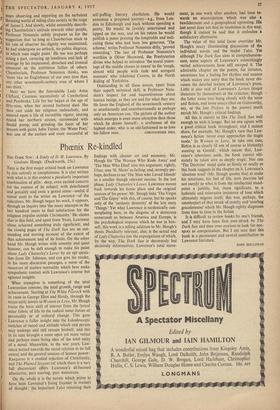Phoenix Re-kindled
THE DARK SUN: A Study of D. H. Lawrence. By
Graham Hough. (Duckworth, 25s.)
THIS is the first major critical book on Lawrence to aim actively at completeness. It is also written with what is in this context a peculiarly important combination of gifts : deep, even excited concern for the essence of its subject, with detachment and wniality and even a genial sense—useful if minor asset in the writer on Lawrence—of the ridiculous. Mr. Hough began his work, it appears, through an inquiry into 'the many attempts in the last hundred years to find satisfaction for the religious impulse outside Christianity.' He claims that in this field, and apart from Yeats, Lawrence alone achieved something truly significant; and the closing pages of The Dark Sun are an out- standing and moving account of the extent of that achievement and of its limits. On the other hand Mr. Hough writes with amenity and quiet humour, can be deft enough to make his point about Lady Chatterley's Lover by an apt quota- tion from Dr. Johnson, and can give his reader, in his more •discursive passages, a sense of the resources of mature normality which here make sympathetic contact with Lawrence's intense but agitated insights.
What transpires is something of the total Lawrentian contour, the total growth, range and achievement. Starting at The White Fel:cock with its roots in George Eliot and Hardy, through the major early novels to Women in Love, Mr. Hough traces the basic shift of interest from the lyrical outer fabric of life to the radical inner forces of personality or of cultural change. This gave Lawrence a fuller insight into the kaleidoscopic switches of mood and attitude which on6 person may undergo and still remain himself, and this in its turn brought a more open yet more varied and perhaps more living idea of the total unity of a novel. Meanwhile, in the war years, Law- rence turned towards the social relation in its full extent, and the general sources of human power: Kangaroo is a studied rejection of Christianity, and The Plumed Serpent (of which there is a very full discussion) offers Lawrence's ill-focused alternative, part moving, part monstrous.
On the whole it is the novels which prove to have been Lawrence's living frontier in matters of thought: the important Tales resuming their findings with cleaner art and economy. Mr. Hough fits 'The Woman Who Rode Away' and The Man Who Died' into this argument; rightly, I fear, sees 'St. Mawr' as failing; and, wrongly per- haps, declines to see 'The Man who Loved Islands' as a smaller though relevant success. In the last phase, Lady Chatterley's Lover, Lawrence moves back towards his home place and the original sources of his power. Mr. Hough links 'The Virgin and The Gipsy' with this, of course, but he speaks only of the 'sardonic dexterity' of the late story 'Things.' Yet what Lawrence is sardonically con- templating here, in the disguise of a dexterous somersault as between America and Europe, is the psychological impasse which he was in him- self; this work is a telling addition to Mr. Hough's thesis. Peculiarly relevant, also, is the actual end of Lady Chatterley (on the expurgations of which, by the way, The Dark Sun is decorously but decisively informative). Lawrence's total move-
meat, in one work after another, had been to- wards an emancipation which was also a bewilderment and a geographical uprooting. His last novel does not find its resolution in this way; though it cannot be said that it embodies a satisfactory alternative.
The• value of this total focus overrides Mr. Hough's many illuminating discussions of the individual novels and the major Tales. Yet although The Dark Sun aims at comprehensive- ness, some aspects of Lawrence's astonishingly varied achievements have still escaped it. The admirable chapter on the poems, for instance, sometimes has a feeling for rhythm and nuance which makes one sorry that the book never dis- cusses the detailed texture of Lawrence's prose. Little is also said of Lawrence's Letters (major literature by themselves) or the criticism; though the latter came into being closely with the verse and fiction, and some essays (that on Galsworthy, say, or the late Preface to the poems) much enrich Mr. Hough's critical findings.
All this is merely to like The Dark Sun well enough to wish it longer. But no one agrees with a good critical book throughout; and I cannot share, for example, Mr. Hough's view that Law- rence's fiction 'never even approaches the tragic mode.' In Women in Love, to take one case, Birkin is as clearly (if not of course as blatantly) wanting as Gerald : which means that, Law- rence's intentions aside, the book cannot ulti- mately be taken save as deeply tragic. Nor can 'The Doctrine' stand quite as firmly or neatly as this book suggests in the chapter, on it. Lawrence's 'absolute need' (Mr. Hough quotes this) to make his intuitions, his feel of life, turn doctrine led not merely to what is from the intellectual stand- point a jumble, but, more significant, to a hubristic and reiterative insistence of tone which ultimately negates itself; this was, perhaps, the counterpart of that streak of cruelty and 'snarling gracelessness' which Mr. Hough rightly diagnoses from time to time in the fiction.
It is difficult to review books by one's friends, and I may have been first over-struck by The Dark Sun and then over-anxious to look for sun- spots as compensation. But I am sure that this book is a permanent and central contribution to Lawrence literature.
JOHN HOLLOWAY














































 Previous page
Previous page